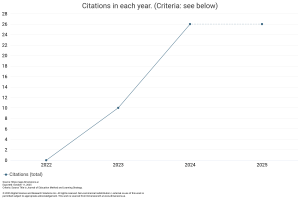Effectiveness of the ‘BANGKIT’ Program to Support the Implementation of ‘Merdeka’ Curriculum in Primary Schools in a Wetland Environment
DOI:
https://doi.org/10.59653/jemls.v2i01.302Keywords:
School Program, BANGKIT, merdeka curriculum, Primary School, WetlandAbstract
This research is motivated by the flexibility provided by the independent curriculum to educational units to develop school programs that suit local geographic, social and cultural characteristics. Higher education institutions as school partners need to conduct research and develop school programs that are relevant to the wetland environment. This research aims to determine the level of effectiveness of the '‘BANGKIT’' school program which is an acronym for Moral, Religious, Numeracy & Literacy, Environmental Care Movement, Collaboration, Information & Technology which is a reference for developing elementary school level school programs in the wetland environment of South Kalimantan. This research used the Research and Development method, the research subjects were 191 elementary school students in South Kalimantan, Indonesia. The research results show that the '‘BANGKIT’' program has proven to be significantly effective in increasing students' moral, religious, numeracy, literacy, ecological, collaboration and technology mastery competencies in wetland environments. The results of this research are supported by the results of the mean difference test using the paired sample t-test method with the help of SPSS software which shows a significance value that is smaller than 0.05 (0.05>0.000), the t-test value is greater than the t-table (2.337> 0.67667), and the posttest mean score was higher than the pretest (137.15>135.05). The level of increase if calculated using the N-Gain method shows a result of 0.312, which means there is an increase in the moderate category.
Downloads
References
Adisya Yusup, W. (2021). Kurikulum Prototipe Sebagai Reformasi Pendidikan di Indonesia. Jakarta: Kompasiana
Ahmad, S. (2018). Meningkatkan Kemampuan Kolaborasi Siswa Kelas Xi Sma Islam Al-Qodir Menggunakan Model TPS. Simki-Techsain, Vol. 02 No. 01 Tahun 2018(Vol. 02 No. 01 Tahun 2018). http://simki.unpkediri.ac.id/detail/14.1.01.06.0009
Arif, Muh. (2020) Metodologi Studi Islam. Cet. 1; Solok Sumatra Utara: Balai Insan Cendekia Mandiri,
Borg, W R & Gall, M D. (2003). Educational Research: an Introduction (7. ed). New York: Logman Inc.
Cambridge Assessment. (2013). What is literacy? An investigation into definitions of English as a subject and the relationship between English, literacy and ‘being literate’. A Research Report Commissioned by Cambridge
Da Fonte, M. A., & Barton-Arwood, S. M. (2017). Collaboration of General and Special Education Teachers: Perspectives and Strategies. In Daga, Agustinus Tanggu. 2021. “Makna ‘merdeka’ Belajar Dan Penguatan Peran Guru Di Sekolah Dasar.” Jurnal Educatio FKIP UNMA 7(3):1075–90. doi: 10.31949/educatio.v7i3.1279.
Davis, K., Boss, J. A., & Meas, P. (2018). Playing in the Virtual Sandbox: Students’ Collaborative Practices in Minecraft. International Journal of Game-Based Learning, 8(3), 56–76. https://doi.org/10.4018/IJGBL.2018070104
Dooley, K., & Sexton-Finck, L. (2017). A focus on collaboration: Fostering Australian screen production students’ teamwork skills. Journal of Teaching and Learning for Graduate Employability, 8(1), 74–105. https://doi.org/10.21153/jtlge2017vol8no1art642
Fiad, U., Suharto, S., & Kurniati, D. (2017). Identifikasi kemampuan literasi matematika siswa smp negeri 12 jember dalam menyelesaikan soal pisa konten space and shape. Kadikma, 8(1), 72-78. doi:10.19184/kdma.v8i1.5256
Harianti, N. (2017). Implementasi Pendidikan Karakter Peduli Lingkungan di Sekolah Dasar Negeri No 99/I Benteng Rendah Kecamatan Mersan Kabupaten Batanghari. September.
Kemdikbud RI. 2022. Kurikulum ‘merdeka’ Jadi Jawaban untuk Atasi Krisis Pembelajaran. Siaran Pers Kementerian Pendidikan, Kebudayaan, Riset, dan Teknologi
Mu‟tasin, Amru Al. (2006). Penciptaan Budaya religius Penrguruan Tinggi Islam (Berkaca Nilai Religius UIN Maulana Malik Ibrahim Malang), Jurnal PAI, 3 (1)
Mutohar Prim Masrokan, (2019). Pengembangan Budaya Religius (Religious Culture) di Madrasah: Strategi Membentuk Katekter Bangsa Peserta Didik.. dalam Jurnal.iainkediri.ac.id/idex.php/didaktika/article/view/109
Sari, P. N., & Nofriya. (2018). Pembentukan Perilaku Peduli Lingkungan Hidup Menuju Sekolah Adiwiyata pada SDN 05 Kampung Pisang Kecamatan IV Koto. Warta Pengabdian Andalas, 25(2), 10–20. Serdenciuc, 2016)
Steme, P., (2010). Primary Teacher Literacy Preparation and Practices in New York State Elementary Schools at Diverse Levels of Achievement and Need. Dowling College Brookhaven, New York. UMI Number: 3416075. ProQuest LLC.
Subianto, Jito. . (2013). Peran Keluarga, Sekolah, dan Masyarakat dalam Pembentukan Karakter Berkualitas. Edukasia: Jurnal Penelitian Pendidikan Islam, 8 (2) 331-354.
Tuti, K. N., & Mawardi, M. (2019). Peningkatan Keterampilan Kolaborasi Dan Hasil Belajar Siswa Melalui Penerapan Model Teams Games Tournament Pada Siswa Kelas 4 Sd Negeri 05 Angan Tembawang. Jurnal Basicedu, 3(2), 320–325. https://doi.org/10.31004/basicedu.v3i2.9
Vhalery, R., Setyastanto, A. M., & Leksono, A. W. (2022). Kurikulum ‘merdeka’ Belajar Kampus ‘merdeka’: Sebuah Kajian Literatur. Research, 2 (1), 230-237.
Downloads
Published
How to Cite
Issue
Section
License
Copyright (c) 2023 Noorhapizah Noorhapizah, Yogi Prihandoko, Diani Ayu Pratiwi, M. Diki Saputra

This work is licensed under a Creative Commons Attribution-ShareAlike 4.0 International License.
Authors who publish with this journal agree to the following terms:
- Authors retain copyright and grant the journal right of first publication with the work simultaneously licensed under a Creative Commons Attribution-ShareAlike that allows others to share the work with an acknowledgement of the work's authorship and initial publication in this journal.
- Authors are able to enter into separate, additional contractual arrangements for the non-exclusive distribution of the journal's published version of the work (e.g., post it to an institutional repository or publish it in a book), with an acknowledgement of its initial publication in this journal.
- Authors are permitted and encouraged to post their work online (e.g., in institutional repositories or on their website) prior to and during the submission process, as it can lead to productive exchanges, as well as earlier and greater citation of published work (See The Effect of Open Access).
























